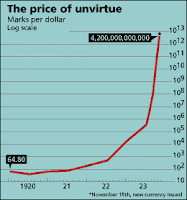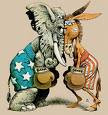Everyday I hear advertisements on talk radio about the purchase of gold as a hedge against the coming demise of the dollar. One radio ad even goes so far as to claim that "gold will be around long after the dollar is a footnote in history." So what's going to happen to poor Ecuador, which uses the US dollar if the buck does go down the economic tubes?
Sounds pretty ominous doesn't it? But think about it, what are these goldmongers accepting in payment for their gold? Is payment in Euros, Pesos, Pounds, Renminbis, Riyals, or Dollars? My point is that paper continues to be the meduim of wealth transfer. Besides, gold is unwieldy and impractical. What pocket change would you get, say if you had to buy a roll of toilet paper on the black market with a Kruggerand?
Often times, gold is held in the form of gold certificates. Examples of gold certificates include the US currency that was in circulation from 1882 until 1933, when America's first fascist dictator, Franklin D. Roosevelt decreed gold ownership to be illegal. Until 1964, it was illegal to possess US gold certificates. I have a five dollar gold certificate that I received as change in 1972 from a liquor store. (I don't think that the clerk realized what he was handing me in change.) The gold cerificate is in safekeeping more as a historical item than as a hedge against hyperinflation. A 2003 IMF article on hyperinflation suggested that despite falling inflation rates worldwide, hyperinflation could happen again. It looks like the IMF analysts may have been more prescient than they realized.
In a PBS Commanding Heights website essay by "Adam Smith" (George J.W. Goodman), "Adam Smith" states that the German Hyperinflation of 1923 was a shock to the German people and gave examples of the results of the monetary crisis:
Before World War I Germany was a prosperous country, with a gold-backed currency, expanding industry, and world leadership in optics, chemicals, and machinery. The German Mark, the British shilling, the French franc, and the Italian lira all had about equal value, and all were exchanged four or five to the dollar. That was in 1914. In 1923, at the most fevered moment of the German hyperinflation, the exchange rate between the dollar and the Mark was one trillion Marks to one dollar, and a wheelbarrow full of money would not even buy a newspaper. Most Germans were taken by surprise by the financial tornado...
...The price increases began to be dizzying. Menus in cafes could not be revised quickly enough. A student at Freiburg University ordered a cup of coffee at a cafe. The price on the menu was 5,000 Marks. He had two cups. When the bill came, it was for 14,000 Marks. "If you want to save money," he was told, "and you want two cups of coffee, you should order them both at the same time...
... The flight from currency that had begun with the buying of diamonds, gold, country houses, and antiques now extended to minor and almost useless items -- bric-a-brac, soap, hairpins. The law-abiding country crumbled into petty thievery. Copper pipes and brass armatures weren't safe. Gasoline was siphoned from cars. People bought things they didn't need and used them to barter-- a pair of shoes for a shirt, some crockery for coffee. Berlin had a "witches' Sabbath" atmosphere. Prostitutes of both sexes roamed the streets. Cocaine was the fashionable drug. In the cabarets the newly rich and their foreign friends could dance and spend money. Other reports noted that not all the young people had a bad time. Their parents had taught them to work and save, and that was clearly wrong...
In retrospect, you can trace the steps to hyperinflation, but some of the reasons remain cloudy. Germany abandoned the gold backing of its currency in 1914. The war was expected to be short, so it was financed by government borrowing, not by savings and taxation. In Germany prices doubled between 1914 and 1919. [Emphasis added.]
By issuing massive amounts of debt, we are testing the will of the world to continue their political support for our exploits, and I think that is a test we will fail at the moment. In order to pass that test we must start implementing a cultural and political roadmap to become a net exporter of goods and technology. The most pressing issue in the next fifty years will be energy, especially as it appears that we are very close to peak oil production. Intrinsically linked with oil are food supplies, and a few decades of current policy will seem (sic) [see] them reach critical levels. [Emphasis added.]
 One thing that many Americans have always been confident of was our ability to produce food. However, I am saddened when I go into the grocery store now. Hansen's apple juice which I thought came from American apples, e.g., Washington State apples, is now is a blend of American and Chinese apple juices. I tried to find American pine nuts in local grocery stores. But all they had were Chinese pine nuts. The same is true for avocados. I live in California's San Diego County where the North County region allegedly produces some of the finest Hass avocados. So what do I find in the local store now? I found that all that's available are Mexican and the really tasteless Chilean Hass avocados. Add to that the fact our manufaturing sector is shrinking in favor of cheap (forced) Chinese and third world laborers. With the Democrat control of all branches of government, including the judicial branch, we can no longer exploit our own natural resources such as our offshore oil fields because of bans on offshore drilling or to protect insignificant wildlife like snail darters or smelt fish. Thank you eco-Nazis for selling out human beings. In effect, we are commiting economic seppuku by disembowling the American economy through overregulaton and excessive taxation. America is rapidly becoming an economic dsytopia.
One thing that many Americans have always been confident of was our ability to produce food. However, I am saddened when I go into the grocery store now. Hansen's apple juice which I thought came from American apples, e.g., Washington State apples, is now is a blend of American and Chinese apple juices. I tried to find American pine nuts in local grocery stores. But all they had were Chinese pine nuts. The same is true for avocados. I live in California's San Diego County where the North County region allegedly produces some of the finest Hass avocados. So what do I find in the local store now? I found that all that's available are Mexican and the really tasteless Chilean Hass avocados. Add to that the fact our manufaturing sector is shrinking in favor of cheap (forced) Chinese and third world laborers. With the Democrat control of all branches of government, including the judicial branch, we can no longer exploit our own natural resources such as our offshore oil fields because of bans on offshore drilling or to protect insignificant wildlife like snail darters or smelt fish. Thank you eco-Nazis for selling out human beings. In effect, we are commiting economic seppuku by disembowling the American economy through overregulaton and excessive taxation. America is rapidly becoming an economic dsytopia. Gold is an archiac concept in an unstable economic world. You can't eat it. You can't plant it to grow food. It won't protect you during civil insurrection, because you really can't buy your way out of trouble. A physically powerful and armed thug will take your gold from you and probably kill you anyway. Gold is a frivolous luxury that is best indulged in during stable economic and political times. The best thing to do is to follow the example of the Mormons. Mormons believe that there will be a seven year famine and store food accordingly. I have childhood memories of a Mormon neighbor, a school principal, stashing large stores of food. My sister and I used to think that we could hear him burying food at night. In the good times of the early 1960s, such behavior seemed crazy if not downright paranoid.
Gold is an archiac concept in an unstable economic world. You can't eat it. You can't plant it to grow food. It won't protect you during civil insurrection, because you really can't buy your way out of trouble. A physically powerful and armed thug will take your gold from you and probably kill you anyway. Gold is a frivolous luxury that is best indulged in during stable economic and political times. The best thing to do is to follow the example of the Mormons. Mormons believe that there will be a seven year famine and store food accordingly. I have childhood memories of a Mormon neighbor, a school principal, stashing large stores of food. My sister and I used to think that we could hear him burying food at night. In the good times of the early 1960s, such behavior seemed crazy if not downright paranoid.But upon further reflection and in consideration of the fiscal recklessness of our current leaders (sic), I've started to store canned food with a long shelf life and bottled water. I buy lots of coffee (only on sale and with coupons). Coffee is good thing to barter for toilet paper or soap. And I don't have to worry about having bulky change in my pocket.
































